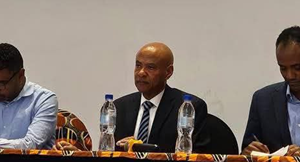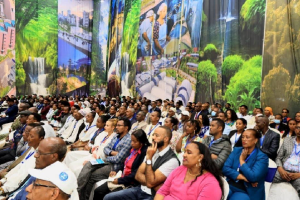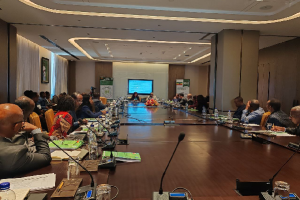
The proposed proclamation over hate speech ought to balance the appropriateness, limits, and strategies to govern sensitive issues and unnecessary political bargains being entertained through mainstream and social media, leaders of contesting political parties say.
The Office of Attorney General is preparing a draft bill aiming to curb hate speech and bring accountability towards public speeches and every other discourse, which is deemed to ignite hate and ethnic tensions in the country. The rise of irresponsible social media activism and fake news in recent times is being blamed as the catalyst especially for ethnic related violence in various parts of the country.
“There are growing concerns about hate speeches and uncensored activism in the country. The need to have a legal ground in bringing upon accountability towards these is not to be left for time,” according to the office of the Attorney General.
The issue of hate speech in Ethiopia lies in a complex nexus with freedom of expression, while hate speech refers to words of incitement and hatred that fosters a climate of prejudice and encourages violent acts against a particular group or individuals. Since a few years ago, millions of innocent Ethiopians have been exposed to displacement, loss of lives, and injuries due to the dissemination of hate speech among the society who lived in harmony for centuries, added the leaders.
Professor Merera Gudina, Chairman of Medrek, told The Ethiopian Herald that criminalizing those who disseminate insults and sensitive words among the societies will not certainly bring sustainable solutions at this unstable political environment.
“In fact, those who intentionally involved in sowing the seeds of hatred and ignite conflict among the people, must be questioned and should know the responsibility they must have, so as to build together a democratic nation,” he stresses.
Thus, the government need to focus on balancing between the limitations and advantages while declaring a governing proclamation in this matter, Merera says, adding that outlawing such kind of expressions should not restrict the democratic struggle that goes on at this time of democratic transition.
He further argues that the government must first discuss with various segments of the society to gain public acceptance before ruling the law, and find the best way to address the problem of hate speech in social media or in public.
Chairman of Unity for Democracy and Justice Party Tigistu Awolu on his part says the problem of hate speech on social media is not new. “Social media has been used for many years to widen the scope of hate attacks and disseminate verbal abuses that lead to emotional violence among peoples.”
He further states, “I think the Bill of Hate Speech is the other form of Anti- Terrorism Law that was proclaimed a few years ago, which limits freedom of expressions in this country.”
According to Tigistu, hate speech is humanistic character so that the government must first work on societal behavioral and attitudinal changes which will never solely governed by law.
He argues that hate speech is mostly generated by politicians and activists through social media against the unquestionable freedom of speech. “For instance, most of the governments in power across the world are those who previously engaged themselves in hate attacks; so that they really know the disadvantages and they fear the reverse will come through their power too.”
According to Tigistu, the other question is how far the government will have the capacity to implement the law as if the issue of cyber technology is at lower level of skilled manpower.
“I am afraid the ruling party will not use the law to revenge its opponents as happened before,” he says, adding, “Hate speech is not good for one’s country when it targets a particular individual or group for sabotage.”
Engineer Yilkal Getnet, Chairman of Ethiopian National Movement Party, says hate speech is the result of the disagreements raised among the peoples, which the government must first address.
“The political system entrenched for the last 27 years forced the people to think and speak in ethnic-centered attitudes.
Since they sow the seeds of hatred on the basis of ethnicity, the act of hate speech should not be considered as a crime.”
As to Yilkal, the rules and regulations being currently proclaimed are a kind of symptom to treat the mistakes done so far. “Indeed, the boundary between free speech and hate speech must also be demarcated,” he says.
According to the politicians, the use of social media platforms should be a collective responsibility of both the government and the society, considering hate speech as one of the destructive tools.
They agreed on that prohibiting hate speech on social media is possible and necessary. But, governing strict user policies will be an impetus for changing the democratic landscape in to making arbitrary decisions, despite free speech does not include impulsive and forceful expressions.
The Ethiopian Herald April 13, 2019
BY ZELALEM GIRMA





